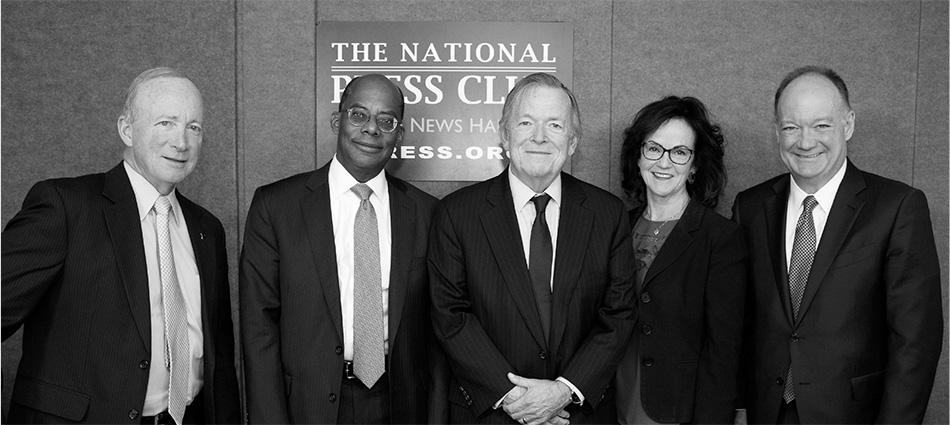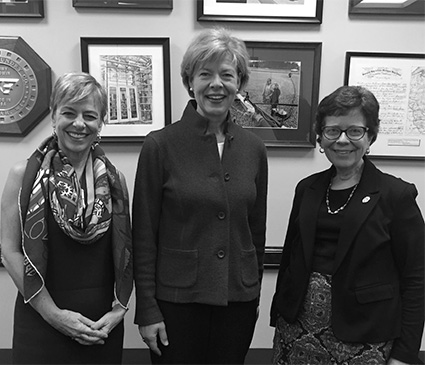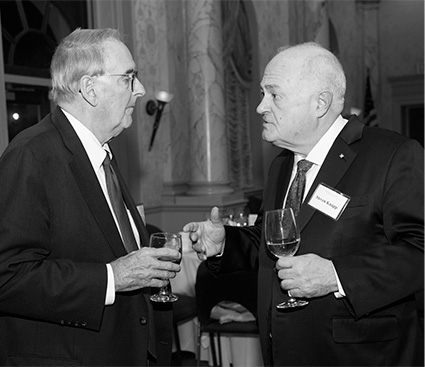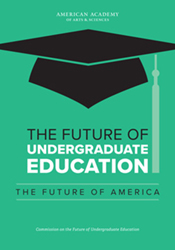Following two years of sustained deliberations grounded in reviews of innovative practices, policies, and studies and informed by meetings with state and federal policy-makers, students and faculty members, and experts from around the country, the Commission on the Future of Undergraduate Education released its final report – The Future of Undergraduate Education, The Future of America – in late November 2017. In the report, the Commission offers a comprehensive national strategy to improve undergraduate education that encompasses three broad recommendations:
- Ensure that all students have high-quality educational experiences;
- Increase overall completion rates and reduce inequities among different student populations at every level of undergraduate education;
- Manage college costs and improve the affordability of undergraduate education.
In the final section of the report, the Commission takes a more speculative approach, looking to the future through the lens of several factors, including the country’s level of social cohesion; the characteristics of the workforce; the level of access to information and educational technologies; and unforeseen natural or human-generated global challenges.
The Academy hosted a series of events in New York and Washington, D.C., to announce the release of The Future of Undergraduate Education, The Future of America and to gain Congressional and national attention and support. Over the course of the rollout week, the Academy convened Commissioners, members, project contributors, policy-makers, and partners at events that included:
- A well-attended official report release and public symposium at the National Press Club in Washington, D.C. The panelists included Academy President Jonathan Fanton, Commission Cochairs Roger Ferguson (TIAA) and Michael McPherson (formerly, Spencer Foundation), and Commissioners Mitchell Daniels (Purdue University), Deborah Ball (University of Michigan), and John DeGioia (Georgetown University).
- Meetings with federal policy-makers, including Under Secretary of Education James Manning and twenty-one Members of Congress and/or their key legislative advisors. The Commission met with twelve Democrats and nine Republicans: eleven from the Senate and ten from the House of Representatives.
- A working lunch with leaders from major Washington, D.C., based higher education associations, including the Association of American Universities, the National Association of Independent Colleges and Universities, the American Association of State Colleges and Universities, the American Association of Community Colleges, the Association of Public and Land-grant Universities, the Council of Independent Colleges, the Association of American Colleges and Universities, and the Aspen Institute.
- An Academy Stated Meeting and panel discussion in New York, featuring Vartan Gregorian (Carnegie Corporation of New York) and Commissioners Michael McPherson, Gail Mellow (LaGuardia Community College), and Nicholas Lemann (Columbia University).
- A dinner for Academy members hosted by Steven Knapp (George Washington University) and the Academy’s Local Program Committee in Washington, D.C. The program featured remarks by Commissioners Rebecca Blank (University of Wisconsin-Madison) and Nicholas Lemann.
Coverage of the release of the final report included articles in The Chronicle of Higher Education, Inside Higher Education, and other media; radio interviews on WAMU and WGBH News; and an event sponsored by The Wall Street Journal that featured Cochair Roger Ferguson, who spoke about the future of higher education. To read these articles and listen to or watch the interviews, please visit the Commission’s website at www.amacad.org/cfue. An electronic version of the final report and supporting publications are also available on the website.

Mitchell Daniels (Purdue University), Roger Ferguson, Jr. (TIAA), Michael McPherson (formerly, Spencer Foundation), Deborah Ball (University of Michigan), and John DeGioia (Georgetown University)
The Academy will continue to engage in a variety of outreach activities throughout 2018 to advance the recommendations in the final report around quality, completion, and affordability. Plans are currently underway for statewide meetings in Wisconsin and Kentucky, involving leaders from private and public colleges and universities and from business and industry, as well as state legislators. Statewide events in Minnesota, Nevada, and California, among other states, are in development.
To extend the dialogue and advance the report’s recommendations, several Commissioners will be speaking at upcoming conferences. Commission Cochair Michael McPherson will give a talk at the Association of American Colleges and Universities’ annual meeting; Commissioner J. Michael Locke (formerly, Rasmussen Inc.) will moderate a discussion about the report at the Arizona State University + Global Silicon Valley Summit; and the final report will be a major focus at TIAA’s annual client forum in April, which attracts hundreds of higher education leaders from around the country
In addition, Mark Zandi (Moody’s Analytics) spoke at the Brookings Institution’s Forum on the Future of Higher Education about an occasional paper his team authored for the Commission on The Economic Impact of Increasing College Completion. Their analysis indicates that an ambitious yet achievable improvement in college completion rates would require substantial investments over a decade and more, but the longer-term effect would be a significant improvement in the productivity of the American economy and a resultant gain in the nation’s standard of living.
Additional outreach activities are being planned, such as convening members of the Academy’s Affiliates Program, which includes sixty-five colleges and universities from around the country, to explore the themes and recommendations in the report; holding small meetings with business leaders who have a strong interest in strengthening undergraduate education; and working with the Academy’s Local Program Committees to feature the work of the Commission at their meetings. The Commission will be developing additional content and publications to further the national dialogue, including report briefs for state policy-makers and higher education institutions that feature top recommendations and a forthcoming issue of Dædalus on higher education, which will be published in fall 2019.
To evaluate the extent to which these outreach efforts are successful in advancing the report’s recommendations, Academy staff and Commission members are discussing indicators that could be monitored over the next five years as a way of understanding the country’s success in improving undergraduate education. Such indicators include the adoption of new teacher training initiatives in graduate programs; new institutional efforts to improve student completion rates; and, at the federal level, the adoption of a single, income-driven repayment plan that automatically enrolls students and collects loan payments through the income tax system. More broadly, the Commission will monitor national completion rates and student loan repayment rates.
The Future of Undergraduate Education, The Future of America reflects the Commission’s highest ideals: that every person, from every background, can succeed in America when given the proper training and preparation; that the country’s existing institutions of undergraduate education can and will evolve to meet the needs of today’s students; and that the free exchange of ideas is the basis of a creative, productive, and democratic society.
The first set of recommendations included in the report focuses on ensuring that all students – whatever their program of study – have high-quality educational experiences that prepare them for success in the twenty-first century.
The report notes that much of the current public discourse about higher education focuses on two systemic challenges: the affordability of a degree and the importance of program completion. But what kind of education is worth students’ commitment of time and their investment of scarce resources? Too little attention has been devoted to this question and to the rigors of the learning experience itself. The Commission believes that some important general characteristics distinguish a quality college education, including the quality of the teaching students encounter. Completion and affordability are critical challenges, but completion and affordability for what?

Hilary Pennington (Ford Foundation), Senator Tammy Baldwin, and Rebecca Blank (University of Wisconsin-Madison) |
The Commission recommends that there should be a greater emphasis in undergraduate education on the educational experience itself and, in particular, on the challenge of ensuring that the seventeen million diverse college students, enrolled in many types of programs, are learning and mastering knowledge, skills, and dispositions that will help them succeed in the twenty-first-century United States. Today’s students face the growing challenges of a changing and more competitive global economy in which they are competing against highly motivated and trained students from around the world. The final report, therefore, focuses first on recommendations that strengthen the student educational experience and student learning. All college graduates – regardless of their major or the credential they will earn – need their programs of study to impart a forward-looking combination of academic knowledge and practical skills so they are prepared for both economic success and civic engagement. The long-standing debate today over the value of a liberal arts education versus a more applied postsecondary program presents a false choice. College educators need to adjust their program curricula and learning expectations accordingly. And students need to see that the ability to work and learn with others, and to disagree and debate respectfully, is a skill essential for a high quality of life, a future of economic success, and effective democratic citizenship.
The Commission recognizes that advancing the broad learning agenda advocated here – and encouraging more attention be paid to the teaching enterprise itself – will remain difficult until more sophisticated and useful ways of measuring what students actually learn are developed. Redressing the lack of good data is a high priority. The Commission calls for far greater attention to and support for the quality of college teaching and the teaching workforce. Students learn in many different settings, including through peer interactions, co- and extracurricular activities, and self-motivated exploration. Ultimately, though, making undergraduate learning stronger and more rigorous will depend upon how undergraduate education invests in the teaching skills of its faculty and the kinds of institutional and systemic commitments that are made.

Jonathan Fanton (American Academy) and Steven Knapp (George Washington University) |
The Future of Undergraduate Education, The Future of America concludes with the following observations: There is a long-standing debate about whether undergraduate education is a private good, serving the needs of individuals, or a public good, meeting larger civic and community needs. The answer, the Commission is convinced, is that undergraduate education is both a public and a private good. Those who invest in an education are consistently rewarded with higher earnings and more stable employment – both important private benefits. In recent decades, the earnings advantage for college graduates has been higher, on average, than ever before. The Commission’s primary goal in writing the report has been to help guide the next stage in the evolution of American undergraduate education, in which all students can afford, complete, and enjoy the benefits of the education they seek when they enroll, an education that truly prepares them for life in the twenty-first century. But beyond the benefits to individuals, there are real public benefits of undergraduate education.
The Commission has identified a profound role that undergraduate education can and indeed must play for the sake of the nation’s future. America is polarized by race, class, and political and religious convictions, among other ways. And yet as we acknowledge and respect difference, we must find opportunities to knit people and communities together in terms of equality and mutual respect. Although this is not a problem that undergraduate education can “solve,” colleges and universities are among the few American institutions in which significant numbers of people from different backgrounds and communities come together for a shared purpose. Although divisions may sometimes produce painful and risky confrontations, they can also create opportunities to build relationships and further mutual understanding. This is, in the Commission’s view, a core component of education and a crucial element for the nation’s civic and political future.
We face huge challenges. Yet the reasons for optimism are real. The country’s colleges and universities have a greater reach across the population than ever before. For all the challenges and tensions evident on many of today’s campuses, we must remember that the long-run trend on campuses has been toward more diversity and inclusion. We harbor no doubts about the value and benefits of a quality college education – it delivers on its promises of greater individual and social prosperity. We are hopeful because more and more colleges are learning how to help students succeed in moving to complete their programs and are developing effective practices that other colleges can emulate. We are hopeful because there are real financial changes and technological opportunities that, if enacted smartly, can further facilitate student success. Progress is not guaranteed, and good things will happen only with sustained effort, but if we combine patience with urgency, we can, through undergraduate education, make great advances as individuals and as a nation.
